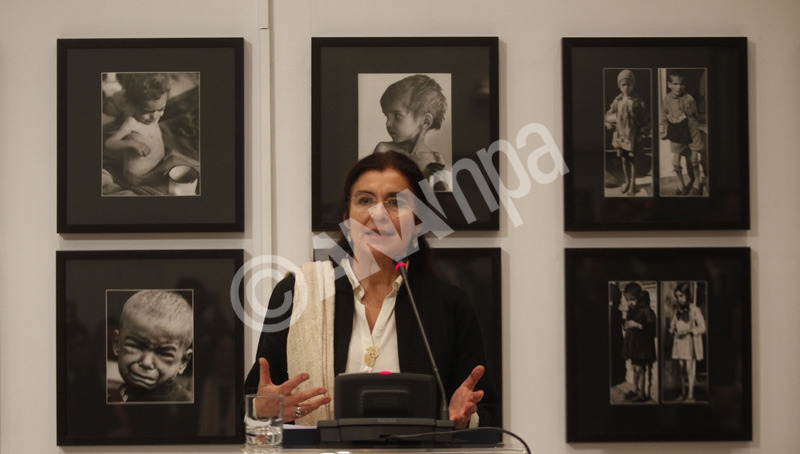 The best way to protect Greece’s monuments, both material and immaterial, was to “bring the citizens closer to them in such as way as to enliven their own love and own awareness that these monuments bring added value to their lives,” Culture Minister Lydia Koniordou said on Sunday, talking to the Athens-Macedonian News Agency (ANA) radio station ‘Praktorio 104.9 FM’.
The best way to protect Greece’s monuments, both material and immaterial, was to “bring the citizens closer to them in such as way as to enliven their own love and own awareness that these monuments bring added value to their lives,” Culture Minister Lydia Koniordou said on Sunday, talking to the Athens-Macedonian News Agency (ANA) radio station ‘Praktorio 104.9 FM’.
“This is Greece’s real capital and perhaps the most important thing it has at this time,” Koniordou said from St. Petersburg, during the ANA’s “Sputnik Express” broadcasting slot, noting that it could translate into progress, prosperity and also help encourage other activities, in education, local community activities, quality tourism and sustainable growth.
Koniordou was interviewed about her visit to St. Petersburg for the inauguration on November 30 of the exhibition “Genii Loci. Greek art from 1930 until today” at the Manege State Museum. The exhibition was among events arranged for the Greece-Russia Year 2016 and features 147 works of art by 100 Greek painters of the 20th century until the present day. The minister also took part in the St. Petersburg International Cultural Forum on December 1-3.
“Like latter-day Noahs, we have to preserve the diamonds of humanity’s adventure and keep these not in a museum but alive, with the subversive and many times even revolutionary spirit they had in their own time, to relay this spirit to the younger generation,” she said.
She noted the Russian public’s strong interest in the Manege Museum exhibition and said Greece needed to invest in this “comparative advantage that all give us credit for.”
Koniordou said that Greece’s intention and goal was to continue cooperating with Russia in these areas after the end of the Greece-Russia Year 2016, while adding that the experience gained will also be put to good use during Greece-China Year, which follows.
“We wish to follow up by cooperating with another important ancient civilization that also seeking to find a balance between outwardness and preserving cultural heritage,” she added.
Category: CULTURE
News about culture and cultural heritage
-
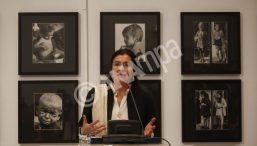
Greece’s cultural heritage is its ‘real capital’, Koniordou tells ANA radio
-
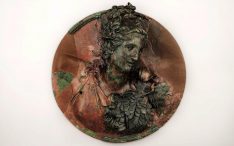
Ancient world on view in Moscow
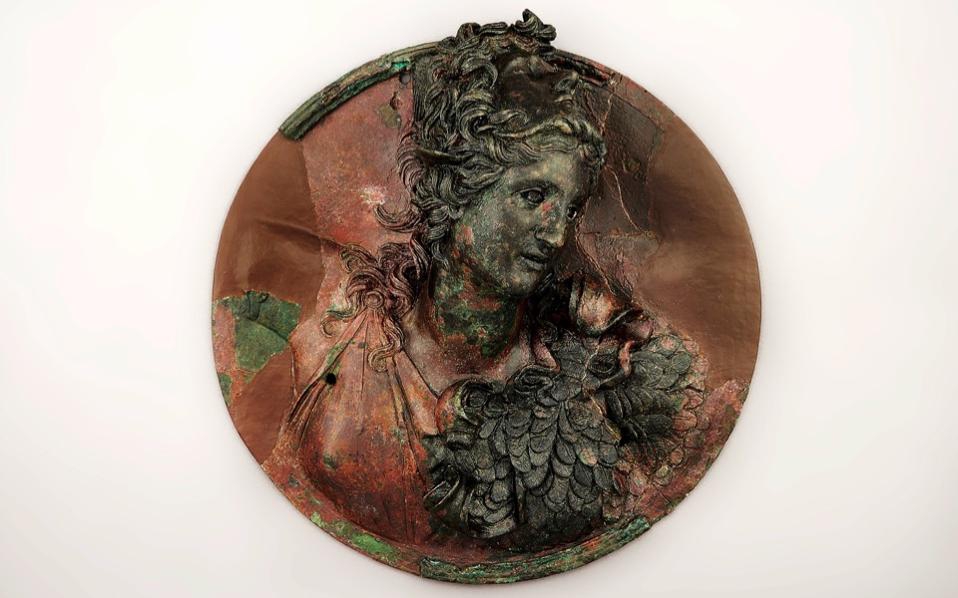 A bronze medal depicting a 2nd century BC bust of Athena Promachos is currently on display in the “Gods and Heroes of Ancient Greeks” exhibition at the State Historical Museum of Russia in Moscow. The exhibition, which runs to February, is part of the “Year of Greece in Russia” series of events. On view are 135 ancient artifacts including sculptures, ceramics, coins and jewelry, among others, dating from prehistoric times up to the Roman era. The objects are on loan from various Greek museums.
A bronze medal depicting a 2nd century BC bust of Athena Promachos is currently on display in the “Gods and Heroes of Ancient Greeks” exhibition at the State Historical Museum of Russia in Moscow. The exhibition, which runs to February, is part of the “Year of Greece in Russia” series of events. On view are 135 ancient artifacts including sculptures, ceramics, coins and jewelry, among others, dating from prehistoric times up to the Roman era. The objects are on loan from various Greek museums. -

Early Learning Languages Australia to Kick-off Preschool Program Teaching Modern Greek
 On Monday the Early Learning Languages Australia (ELLA) program announced open applications for its educational program which uses the application called Polyglots to help teach foreign languages.
On Monday the Early Learning Languages Australia (ELLA) program announced open applications for its educational program which uses the application called Polyglots to help teach foreign languages.The announcement comes as the Australian government has committed itself to upping funding in promoting foreign languages in education programs, including an outreach to preschool-aged students.
Only 12 percent of children in Australia currently study a secondary language at school, government officials reported.
So far there are over 10,000 children who take part in the language program, utilizing the app to learn Chinese, Japanese, French, Indonesian and Arabic.
ELLA also announced that along with Modern Greek, Hindi will also be available to youngsters in 2018, while other new languages to kick-off in 2017 include Italian and Spanish.
“Seeing and hearing young children counting, following recipes and singing in a language that isn’t their native tongue, you understand how engaging this app is and why it has had such positive feedback from kids, educators and families,” Minister for Education and Training Simon Birmingham commented to neoskosmos.com.
Applications are now open for all Australian childcare centers and preschools at www.ella.edu.au
-
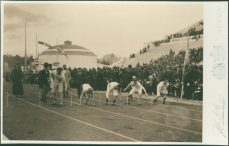
Benaki Museum Crowdfunding Campaign: Athens 1896 Olympic Games Photo Exhibition – US Tour
 The Benaki Museum launches its first crowdfunding campaign
The Benaki Museum launches its first crowdfunding campaignThe Benaki Museum is launching its first crowdfunding campaign on the occasion of the exhibition in America of the photographic album of Albert Mayer from the first modern Olympic Games of Athens in 1896.
The exhibition kicks off in New York City in December 2016 with events at both the United Nations and the Consulate General of Greece. The campaign’s goal is to raise $100,000 which will allow the album to continue its 2017 tour in at least four additional US cities as Hellenes of Diaspora, Phihellenes, photo enthusiasts, Olympic memorabilia collectors and friends of the Benaki Museum have shown great interest in the exhibition. The campiaign will run until end of January.
US donors will receive a tax-deductible receipt and a special gift from the Benaki Museum.
How you can support the Benaki Museum fundraising campaign:
1) Donate: You can make a donation online by clicking on the “Donate Now” button above or by clicking here. You can also contribute offline by check or through a wire transfer. We will add the amount of your donation to the campaign’s goal (along with your name, if you wish so).
2) Share: You can help the Benaki Museum campaign by sharing it with family and friends using this link: http://crowdfunding.benaki.gr
3) Fundraise: You can also be part of our fundraising campaign by creating your own page as an Individual or Team (group of friends, corporate, media, etc.). You can set your own fundraising goal (i.e. $100) and invite others to help you reach your goal.
By supporting the Benaki Museum you contribute in the continuation of the largest depository of trust to some of the Greece’s most important art treasures spanning over 8.000 years of history in over 120.000 artworks dating all the way from the Paleolithic Era to the present.
Join our early supporters and campaign ambassadors / fundraisers!
Special Gifts for your Donation and Support:
Each donor will receive a special gift from the Benaki Museum including:
– $10 Donation
- Athens 1896 Olympic Games photo e-card
– $20 Donation
- Athens 1896 Olympic Games photo e-card
- Complimentary entrance to the Benaki Museum in Athens*
* you may donate the ticket to someone in Greece who is less fortunate
– $50 Donation
- All the above
- An extra ticket to use as above
- Set of 4 printed postcards with photos from the Athens 1896 Olympic Games album (see photos above)
– $100 Donation
- All the above
- Complimentary Annual Membership to the Museum (value: $100)
– $500 Donation
- All the above
- A print Guide to the Benaki Museum
- 10% discount for Benaki Museum e-shop items (up to 150€)
– $1,000 Donation
- All the above
- A 44*33 cm photo reproduction from the Athens 1896 Olympic Games album (unframed- see photos above)
Teams and Individuals who will donate or raise an amount larger than $1,000, will receive:
– $2,000- $5,000
- Attic lekythos – This red-figured Attic oil-flask (lekythos) depicted a male figure leaning on his staff with a stlengis in his hand. A stlengis was used by athletes to scrape oil and dirt off their bodies.
– $5,001 – $10,000
- Stlengis – Copper stlengis of c. 450-400 BC. It was used by athletes for scraping oil and dirt off their bodies after the end of the contests
– $10,001 and above
- Stlengis and aryballus – Copper stlengis of c. 450-400 BC and globular Corinthian aryballus dated to c. 600-575 BC bearing griffins flanking an aquatic bird. Both objects were used by athletes, a stlengis for scraping oil and dirt off their bodies after the end of the contests, an aryballus for storing and transporting essences.
All campaign fundraisers will receive a complimentary guided tour
of the Benaki Museum
About the Athens 1896 Olympic Games Photo AlbumAlbert Meyer was one of the most famous photographers of that period and he traveled to Athens for the Games, becoming the official photographer of the German team. The Press announced the making of the Album before it had even commenced. The Greek newspaper of Trieste Imera (Day) as well as the Athenian Akropolis both wrote that the album would turn out to be the keepsake of the Games for the royal courts all over the world, as well as for the members of the Olympic Games Committee.
The 25 rather spartan photographs of the album capture the chronicle of the Games, beginning with the photograph of the International Committee and that of the Greek national benefactor Georgios Averof. The following photographs capture both the athletic rituals and efforts. The runners, the discus throwers, the shot put competitors and gymnastics athletes who project the urban tradition of western European countries in exercises of acrobatic precision, follow the photograph of the Philharmonic Orchestra. The photographs with the rings, the pommel horse and the horizontal bars lead to the one of the Greek emblem of the Games, the Marathon runner, (water carrier by profession) Spyros Louis, who poses for Albert Meyer wearing a national costume after winning the First Marathon.
The photographic archive of Albert Meyer, including his photos from the Olympic Games, was destroyed in 1945, when bombardments flattened Dresden, Germany, hence turning the original photographs into rare and priceless artifacts.
The few copies of the leather album were distributed to the members of the Olympic Games Organizational Committee, amongst which was George Streit, banker and minister of the Greek government of the period. Marinos Yeroulanos, president of the Board of Trustees of the Benaki Museum for many years and grandson of George Streit, donated the album to the Historical Archives of the Museum. Since then, this unique Album is safeguarded with care as imposed by its rarity, being a unique token to both History and Art.
About the Benaki Museum
The Benaki Museum was founded by Antonis Benakis in 1930 and subsequently donated to the Greek state. It is the oldest museum in Greece operating as a Foundation under Private Law.
Situated in a set of six buildings open to the public, the Museum covers a broad section of the art spectrum, featuring 5 archival departments, an extensive library, over 500,000 objects of art, books, photographs, archives and rare documents.
The Museum welcomes over 150,000 visitors per year and offers a wide range of educational and cultural activities for all ages. With extensive collections covering several cultural fields and a range of activities serving various social needs, the Benaki Museum assumes a unique place as a complex institution among the broader network of museum foundations in Greece. By virtue of its collections, the Benaki Museum is best described as the museum of Greek Civilization in all its manifestations. In addition, it brings Hellenic Culture into dialogue with world cultures, as it accommodates significant collections of Islamic Art and Chinese Pottery, among others.
Every year, the Benaki Museum presents to the public a variety of temporary exhibitions and organizes conferences, lectures, and special events on subjects arising from the its collections and its vast range of activities.
The Museum has earned recognition beyond the Greek borders and made collaborations and partnerships with established cultural entities, including the Metropolitan Museum of Art in New York, the Royal Academy of Arts in London, the Powerhouse Museum in Sydney, the University of Oxford and Princeton University. Its collections feature in Europeana and Google Art Project, among many other digital platforms.
The main mission of the Benaki Museum is to inspire love for knowledge as well as to encourage people to reflect on world cultural heritage and human interaction across space and time. Following a policy of extroversion and democratization, the Museum provides open access to its collections and archives, thus promoting education, research and the exchange of knowledge. After years of intensive works the Museum’s social impact, as well as its resilience and self-sufficiency, have been firmly established.
-
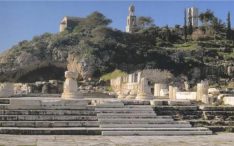
Elefsina Wins ‘European Capital of Culture 2021’
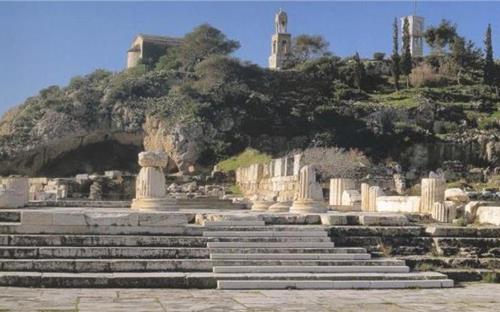 Elefsina, west of Athens, has won the title of “European Capital of Culture 2021”, the selection panel of independent experts responsible for assessing the Greek cities competing for the title announced on Friday.
Elefsina, west of Athens, has won the title of “European Capital of Culture 2021”, the selection panel of independent experts responsible for assessing the Greek cities competing for the title announced on Friday.
Three cities had been short-listed after the initial pre-selection round in February 2016: Elefsina, Kalamata and Rhodes.“In 2021, Greece will host its fourth European Capital of Culture after Athens in 1985, Thessaloniki in 1997 and Patras in 2006″, Tibor Navracsics, European Commissioner responsible for Education, Culture, Youth and Sport, said.
Underlining how popular the EU initiative is with cities and citizens, Navracsics congratulated Elefsina on its successful bid.
“I look forward to seeing Elefsina give visitors from Europe and all over the world the opportunity to discover the city and its cultural assets but also to appreciate the diversity of cultures in the European Union as well as our shared values – this is today more vital than ever”, he said.
Navracsics added that — as many previous European Capitals of Culture have shown — the title can bring the selected city significant long-term cultural, as well as economic and social benefits. “Benefits that Elefsina now stands to reap as well”, he said.The main idea of Elefsina’s bid — Eleusis 2021 — was summarized in the phrase “Transition to EUphoria”, which highlighted the relationship between sustainability and the connection of all human activities with art and culture.
There are three European Capitals of Culture for 2021. Elefsina in Greece, Timisoarain Romania and Novi Sad in Serbia, a candidate country for EU membership.
Born in 1985 on an idea of the then Greek Minister of Culture, Melina Mercouri, the European Capitals of Culture have grown into one of the most ambitious cultural projects in Europe and one of the best known – and most appreciated – activities of the EU. Their objectives are to promote the diversity of cultures in Europe, to highlight the common features they share and to foster the contribution of culture to the long-term development of cities.
-

Stavros Niarchos Foundation: 20 years of grantmaking activity
 The Stavros Niarchos Foundation celebrates its 20th anniversary, fulfilling the original purpose of its establishment: to contribute, with all the means at its disposal, to the improvement of the lives of those less privileged and to support organizations and projects that are expected to achieve a broad, lasting and positive impact for society at large.
The Stavros Niarchos Foundation celebrates its 20th anniversary, fulfilling the original purpose of its establishment: to contribute, with all the means at its disposal, to the improvement of the lives of those less privileged and to support organizations and projects that are expected to achieve a broad, lasting and positive impact for society at large. The SNF’s philanthropic activity, to date, has spread across 111 countries, with particular emphasis on Greece which—among other grants and programs—is where some of the most important initiatives of the Foundation are being developed, such as the development of the SNFCC, alongside Initiatives Against the Greek Crisis and for Recharging the Youth.
Since the commencement of its activities in 1996, to date, the SNF has made grant commitments of $1.9 billion (€1.56 billion), through 3,646 grants to nonprofit organizations across the world, in four main areas: Arts and Culture, Education, Health and Sports, and Social Welfare.
Specifically, during the last 20 years, the SNF has committed the following, in total:
▪ Arts & Culture: 752 grants (totaling €387 million), with the key strategic objective of broadening public access to the Arts, promoting Greek art and culture worldwide, encouraging creative partnerships between institutions, organizations and artists on a national and global level, as well as strengthening the social role of cultural organizations.
▪ Education: 1,107 grants (totaling €484 million), supporting the implementation of innovative educational programs, the establishment of new, innovative education centers in Greece and abroad, and the creation of significant capacity building opportunities for the benefit of numerous social groups.
▪ Health & Sports: 672 grants (totaling €287 million), which aim to improve the quality of life of society as a whole, while simultaneously helping to widen accessibility to comprehensive health care services for all.
▪ Social Welfare: 1,115 grants (totaling €409 million), mainly focusing on the needs of the most vulnerable groups (children, the elderly, the homeless, refugees, the disabled, etc.).
Initiatives: Against the Greek Crisis & Recharging the Youth
In addition to its regular grant-making activities, and in order to contribute towards the efforts to address the multifaceted effects of the crisis on the Greek society, the Foundation, beginning in 2012, launched initiatives totaling €300 million, with the aim of providing immediate relief to those mostly affected by the crisis, as well as creating new opportunities and better employment prospects for the younger generation, which has been severely impacted by one of the highest percentages of youth unemployment in Europe.
As part of the Grants against the Greek Crisis, the SNF has made 494 grants, totaling €164 million, in order to address the effects of the crisis. The purpose of this initiative is twofold: through the supported programs, it aims, on the one hand, to contribute to the immediate relief of those impacted more severely from the crisis and, on the other hand, to create those necessary conditions which will ensure long-term benefits. In this context, a series of grants were designed, based on a strategic and long-term perspective. The majority of grants supported the development, adaptation and expansion of existing social programs and the operation of grantee organizations. Additional grants were made for the purchasing of equipment or vehicles, as well as the construction and renovation of social structures.
As part of the Recharging the Youth Initiative, the SNF has made 57 grants, totaling €38 million, focusing on programs aimed at the development of entrepreneurship, the creation of skills, as well as education, while it continues to develop and assess programs—in collaboration with various local and international partners—which have the potential to provide a boost in youth employment.
Stavros Niarchos Foundation Cultural Center
In addition to the SNF’s 3,646 grants and the special initiatives, the Foundation’s philanthropic activity is complemented by the creation of a new landmark for the city of Athens: the Stavros Niarchos Foundation Cultural Center (SNFCC). The SNFCC is the Foundation’s largest single gift, with a total budget of €617 million, and it has already recorded some significant successes, even before its official delivery to the Greek State, which will be the project’s legal owner.
▪ The SNFCC’s construction was completed within 4 years, adhering, without any major deviations, to the original project timetable, despite the project’s scope and complexity.
▪ Designed by the Renzo Pianο Building Workshop, the SNFCC is one of the few projects worldwide, which houses two national cultural and educational institutions, namely the Greek National Opera and the National Library of Greece, complementing them with the Stavros Niarchos Park, with a total surface area of 210,000 m², which connects the city center with the urban waterfront.
▪ According to a study by the Boston Consulting Group, during the project’s construction, the SNFCC added €1.1 billion to the country’s Gross Domestic Product (0.2% of GDP per year), contributing €57 million in tax revenues. According to the same study, the construction of the SNFCC created more than 13,000 jobs, in total.
▪ During the project’s implementation, best practices were used in terms of construction, alongside a mix of traditional and innovative materials, which ensured the SNFCC’s innovation and functionality. The SNFCC earned the prestigious Platinum LEED certification, the highest possible rating for environmentally conscious and sustainable buildings.
▪ Beginning in mid-August of 2016, when the project opened its doors to the public through a series of free events, funded exclusively by the SNF, the SNFCC welcomes on a weekly basis more than 35,000 visitors.
Andreas Dracopoulos, Co-President of the Stavros Niarchos Foundation, stated: “At a first glance, the 20-year course of the Stavros Niarchos Foundation may reflect the innumerable needs of society worldwide. For us, however, it also reflects people’s possibilities and prospects, for which we should all strive more. We feel proud that after 20 years of grant making activity, we have managed to evolve and strengthen our initiatives, while at the same time remain flexible to respond to all kinds of challenges, from the greatest ones, such as the creation of the SNFCC, to supporting a small organization that demonstrates vision and commitment. We hope to continue in the same way in the coming years, helping to make our world a better place, to the best of our abilities.”
-
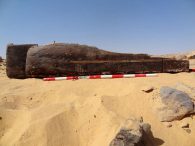
Two new pharaonic cemeteries discovered in Aswan
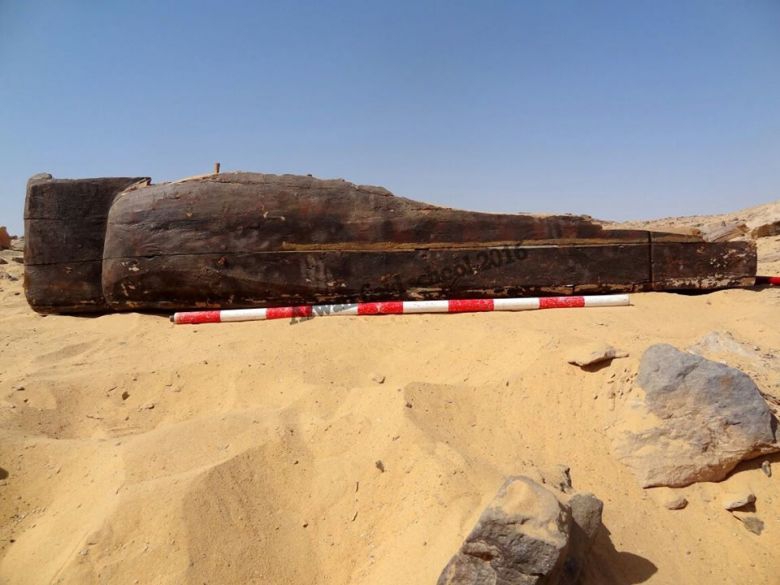 Two rock-carved cemeteries belonging to the Late Period of ancient Egypt have been discovered close to the shrine of Agha Khan, located west of Aswan, the Antiquities Ministry said in a press release on Monday.
Two rock-carved cemeteries belonging to the Late Period of ancient Egypt have been discovered close to the shrine of Agha Khan, located west of Aswan, the Antiquities Ministry said in a press release on Monday.Nasr Salama, head of the ministry’s department for Aswan and Nubia antiquities, said the two cemeteries were badly preserved, with no inscriptions were found on the walls.
However, the remains of tombs and mummies were found inside. Salama said that stairs were discovered that lead to a small, square burial chamber.
The discovery was made by the ministry’s school for excavations. Adel Tohamy, head of the school, said the archaeologists trained at the school were using modern equipment for archaeological excavation and documentation.
-
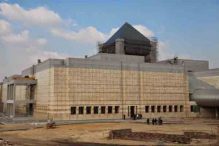
Egypt’s Grand Museum, National Museum of Egyptian Civilization to have separate management
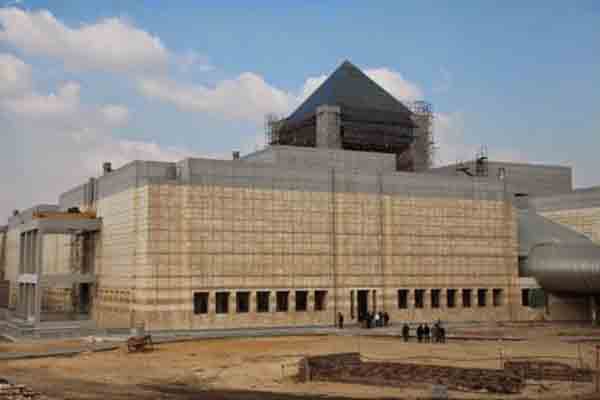 Prime Minister Sherif Ismail issued a ministerial decree to establish two independent General Authorities for the Grand Egyptian Museum (GEM) and the National Museum of Egyptian Civilization (NMEC) under the supervision of the antiquities ministry.
Prime Minister Sherif Ismail issued a ministerial decree to establish two independent General Authorities for the Grand Egyptian Museum (GEM) and the National Museum of Egyptian Civilization (NMEC) under the supervision of the antiquities ministry.Minister of Antiquities Khaled El-Enany said the decree states that every authority would have its own board of trustees composed of a group of Egyptian and prominent international public figures with experience in the field.
Every board would draft the museum’s general policies, setting up a work programme and managing the museum’s budget through studying the grants, donations and gifts provided from international, regional and local parties, within the articles of law and regulations that organise them.
The board of trustees, he added, would also appoint the museum director and his two assistants.
GEM’s Supervisor General Tarek Tawfik described the decree as ideal because it would facilitate administrative work in both museums as well as decrease its bureaucracy.
He went on to say that the board of trustees would push the work forward to make the dream of both museums come true.
-
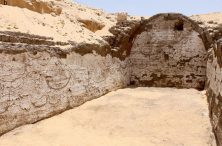
3,800-Year-Old ‘Tableau’ of Egyptian Boats Discovered
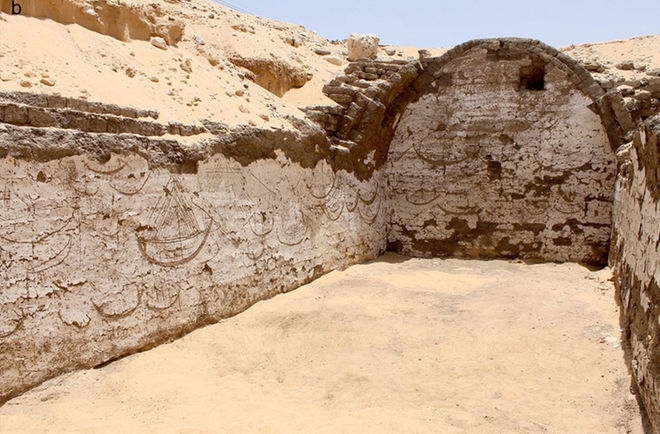 More than 120 images of ancient Egyptian boats have been discovered adorning the inside of a building in Abydos, Egypt. The building dates back more than 3,800 years and was built near the tomb of pharaoh Senwosret III, archaeologists reported.
More than 120 images of ancient Egyptian boats have been discovered adorning the inside of a building in Abydos, Egypt. The building dates back more than 3,800 years and was built near the tomb of pharaoh Senwosret III, archaeologists reported.The tableau, as the series of images is called, would have looked upon a real wooden boat said Josef Wegner, a curator at the Penn Museum at the University of Pennsylvania, who led the excavation. Only a few planks remain of the wooden boat, which would have been constructed at Abydos or dragged across the desert, Wegner said. In ancient Egypt, boats were sometimes buried near a pharaoh’s tomb. [In Photos: Tomb Painting Discovered Near Great Pyramid of Giza]
Etchings and a boat
Archaeologists found that the tableau was incised on the white plaster walls of the building.
The largest images are nearly 5 feet (1.5 meters) in length and show “large, well-rendered boats depicted with masts, sails, rigging, deckhouses/cabins, rudders, oars and in some cases rowers,” wrote Wegner in an article published in the International Journal of Nautical Archaeology. Some images are small and simple, the smallest reaching only about 4 inches (10 centimeters) in length, wrote Wegner.
Though 120 boat images survive today, there would have been more incised on the building walls in ancient times, Wegner wrote. In addition to the boats, the tableau contains incised images of gazelle, cattle and flowers, he noted.
Near the entranceway of the building — whose interior is about 68 feet by 13 feet (21 by 4 m) — archaeologists discovered more than 145 pottery vessels, many of which are buried with their necks facing toward the building’s entrance. “The vessels are necked, liquid-storage jars, usually termed ‘beer jars’ although probably used for storage and transport of a variety of liquids,” wrote Wegner in the journal article.The existence of the building was first noted in a 1904 report by an Egypt Exploration Fund (EEF) team that worked at Abydos between 1901 and 1903. However, that team didn’t have time to excavate the building and didn’t know what was in it; “they came down on the very top of the boat building. They saw the vault of it but abandoned work,” Wegner said.
Many mysteries
The discoveries leave archaeologists with a series of mysteries that future excavations may help solve. [7 Amazing Archaeological Discoveries from Egypt]
The archaeologists don’t know who drew the tableau or why they created it. “We can’t conclusively answer that on the basis of what’s preserved,” Wegner told Live Science. However, the researchers think multiple people created the tableau within a short period of time, he added.
One possibility is that the people who built the boat also created the tableau, he said. Or, perhaps, a group of people taking part in a funerary ceremony after the death of pharaoh Senwosret III etched the images onto the building walls. Yet another possibility is that a group of people gained access to the building after the pharaoh died and created the tableau. Archaeologists found that a group of individuals entered the building at some point after the pharaoh’s death and took the boat apart, reusing the planks.
Archaeologists are also puzzled over the purpose of all the pottery found near the entrance of the building. It’s possible that those attending a funerary ceremony could have spilled liquid from the pots on the ground on purpose. “Potentially a massive decanting of liquid, likely predominantly water, at the entrance of the building was a way of magically floating the boat,” Wegner wrote in the paper. The boat would not have been literally floated if this ceremony took place.
Another possibility is that the wooden boat was transported on a wooden sledge across the desert. In that case, “water and other liquids may have been used to lubricate and solidify the ground along the path of the boat as it was pulled from the floodplain to its desert resting place,” wrote Wegner, adding that “the ceramic vessels used in this journey may themselves have taken on a ritual significance, and both boat and jars were then buried together as ceremonial interment of objects associated with royal mortuary rites.”
The team plans to carry out excavations in the future that may help solve the various mysteries, he said.
Wegner’s team, in cooperation with Egypt’s Ministry of State for Antiquities, carried out the excavations of the building between 2014 and 2016.
-

The Alexandria International Conference on Maritime and Underwater Archaeology
 Egypt has provided humanity with a majestic concrete civilization that continued for thousands of years since the break of dawn. Historians and archaeologists have been interested in studying this civilization and its endlessly creative, accomplished legacy. Marine archaeology is considered one of the new sciences that studies the Ancient Egyptian Civilization throughout its different ages through archaeological findings, either underground or underwater. Egypt witnessed an attention paid to underwater and marine archaeology for many years, since several institutes and individuals were keen on finding underwater antiquities and affiliating marine cities and active and obliterated harbors, and getting to know the old navigation methods, and the related trade and marine activity. Consequently, researchers delved in this infinite science full of mystery and joy of discovering.
Egypt has provided humanity with a majestic concrete civilization that continued for thousands of years since the break of dawn. Historians and archaeologists have been interested in studying this civilization and its endlessly creative, accomplished legacy. Marine archaeology is considered one of the new sciences that studies the Ancient Egyptian Civilization throughout its different ages through archaeological findings, either underground or underwater. Egypt witnessed an attention paid to underwater and marine archaeology for many years, since several institutes and individuals were keen on finding underwater antiquities and affiliating marine cities and active and obliterated harbors, and getting to know the old navigation methods, and the related trade and marine activity. Consequently, researchers delved in this infinite science full of mystery and joy of discovering.Not only had the Egyptian Ministry of Antiquities paid attention to afford the opportunity to excavations in Egypt by foreign missions specialized in underwater and marine archaeology and collaborated in their scientific and archaeological work, but also founded the Department of Underwater Antiquities in Alexandria in 1996 to be the specialized annex of the Ministry entrusted with enriching Egyptian archaeological and scientific research in the field, and the section responsible for revealing the secrets of this amazing, deep world of Egyptian legacy. This was until the Department became a central department of underwater antiquities, thus in charge of more practical and scientific responsibilities including the organization of archaeological work and specialized scientific collaboration in the field of underwater and marine archaeology, not only in Alexandria, but all over Egypt, whether in the Mediterranean, the Red Sea, or the River Nile. The Bibliotheca Alexandrina, since its foundation, also paid attention to reviving the rich Egyptian civilizational legacy represented in the Ancient Bibliotheca Alexandrina. It paid attention to archaeology in general, and marine and underwater antiquities specifically. Thus, galleries, meetings, workshops, and others were organized; books and prints tackling this important subject were published, either via Alexandria Project, which documents the Ancient Bibliotheca Alexandrina and its legacy, or other activities of the New Bibliotheca Alexandrina and its research centers.
The Bibliotheca Alexandrina, represented in the Alexandria Project, and the Egyptian Ministry of Antiquities, represented in the central Department of Underwater Antiquities, celebrating the 20th anniversary of the foundation of the central Department of Underwater Antiquities, realized that together Underwater and Marine Archaeology should be celebrated through calling for holding the Alexandria International Conference for Underwater and Marine Antiquities, 31 October – 2 November 2016, in Alexandria, Egypt, to present the different aspects of this field, and to study the latest specialized archaeological findings. The three-day Conference tackles the following topics:
- Archaeological harbors:
- Marine ports and harbors
- Ancient shipbuilding:
- Boats and ships in Ancient Egypt
- Boats and ships in Ancient Mediterranean
- Ships in the Islamic Era
- Underwater archaeological sites:
- Archaeological findings in Egypt.
Those in charge of the Conference were honored to participate with the European Institute for Underwater Archaeology (IEASM) headed by Professor Franck Goddio, and the Centre for Alexandrian Studies (CEAlex) headed by Archaeologist Mary Dominick Nina, in terms of financial support and organization.
The Conference is honored to have an elite of Egyptian and international historians and archaeologists specialized in studying underwater and marine antiquities in several archaeological missions, inside and outside Egypt. Twenty-five scientists and archaeologists from Egypt, France, Greece, Italy, Japan, Poland, Russia, Tunisia, Turkey, United Kingdom, and United States of America, participated in the Conference.
The Conference also honors pioneer individuals and institutions in underwater and marine archaeology, who exerted distinguished and distinct efforts, enriched this archaeological work in Egypt, and contributed in establishing its bases. The Conference honors the following:
- Name of Prince Omar Tousson
- Name of Mr. Kamel Abou el-Saadat
- Name of Archaeologist Honor Frost
- The Archaeological Society of Alexandria
- Dr. Ibrahim Darwish
- Archaeological harbors: